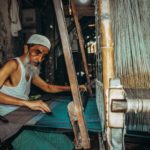The origin of the jamdani is lost in the mists of history and mystery.
Here are some of the oft-repeated factoids. Jam-dani refers to flowers in a vase. Some also say that it refers to Jama (or cloth). “Jamdani is a technique,” says Chandra Jain, a textile expert in Bangalore. “This is why weavers in Uppada say that they make jamdani sarees.”
Most everyone trots out the earliest reference as being in the Arthashastra, a Sanskrit treatise written over many centuries by multiple authors but now attributed to Chanakya and dated now as written between the 2nd and 3rd centuries B.C. That is more than two millennia ago. I read the English translation here
Well, for starters, the Arthashastra doesn’t refer to the jamdani. But it does mention cotton a lot. It talks about soft cotton, which people assume to be muslin. The exact verse is below. Dukula is the term that is the predecessor of muslin, is the assumption.
That which is manufactured in the country, Vanga (vangaka) is a white and soft fabric (dukúla); that of Pándya manufacture (Paundraka) is black and as soft as the surface of a gem; and that which is the product of the country, Suvarnakudya, is as red as the sun, as soft as the surface of the gem, woven while the threads are very wet, and of uniform (chaturasra) or mixed texture (vyámisravána).
We learn many things from a chapter on weaving. Women did it. Chanakya was strict and expected thumbs to be cut off if the work wasn’t done. Read it at the end of this section below.
The next reference comes from the Periplus of the Erythrean Sea, a 1st century A.D. text, which talks about the soft cottons of the gangetic plains emptying the coffers of Rome.
Sanskrit poetry has many references to this soft cotton. A poem by Banabhatta talks about how Lakshmi wears this muslin cotton drapes and her form emerges from the cloth.
Chanakya’s chapter on weaving.
CHAPTER XXIII. SUPERINTENDENT OF WEAVING.
THE Superintendent of Weaving shall employ qualified persons to manufacture threads (sútra), coats (varma), cloths (vastra), and ropes.
Widows, cripple women, girls, mendicant or ascetic women (pravrajitá), women compelled to work in default of paying fines (dandápratikáriní), mothers of prostitutes, old women-servants of the king, and prostitutes (devadási) who have ceased to attend temples on service shall be employed to cut wool, fibre, cotton,
panicle (túla), hemp, and flax.
Wages shall be fixed according as the threads spun are fine, coarse (sthúla, i.e., big) or of middle quality and in proportion to a greater or less quantity manufactured, and in consideration of the quantity of thread spun, those (who turn out a greater quantity) shall be presented with oil and dried cakes of myrobalan fruits
(tailámalakódvartanaih).
They may also be made to work on holidays (tithishu) by payment of special rewards (prativápadánamánaih).
Wages shall be cut short, if making allowance for the quality of raw material, the quantity of the threads spun out is found to fall short. Weaving may also be done by those artisans who are qualified to turn out a given amount of work in a given time and for a fixed amount of wages.
The superintendent shall closely associate with the workmen. Those who manufacture fibrous cloths, raiments, silk-cloths, woollen cloths, and cotton fabrics shall be rewarded by presentations such as scents, garlands of flowers, or any other prizes of encouragement. Various kinds of garments, blankets, and curtains
shall be manufactured.
Those who are acquainted with the work shall manufacture mail armour. Those women who do not stir out of their houses (anishkásinyah), those whose husbands are gone abroad, and those who are cripple or girls may, when obliged to work for subsistence, be provided with work (spinning out threads) in due courtesy through the medium of maid-servants (of the weaving establishment.) Those women who can present themselves at the weaving house shall at dawn be enabled to exchange their spinnings for wages (bhándavetanavinimayam). Only so much light as is enough to examine the threads shall be kept.
If the superintendent looks at the face of such women or talks about any other work, he shall be punished with the first amercement. Delay in paying the wages shall be punished with the middlemost amercement. Likewise when wages are paid for work that is not completed.
She who, having received wages, does not turn out the work shall have her thumb cut off. Those who misappropriate, steal, or run away with, (the raw material supplied to them) shall be similarly punished. Weavers, when guilty, shall be fined out of their wages in proportion to their offences.
The superintendent shall closely associate with those who manufacture ropes and mail armour and shall carry on the manufacture of straps (varatra) and other commodities. He shall carry on the manufacture of ropes from threads and fibres and of straps from cane and bamboo bark, with which beasts for draught are trained or tethered.




